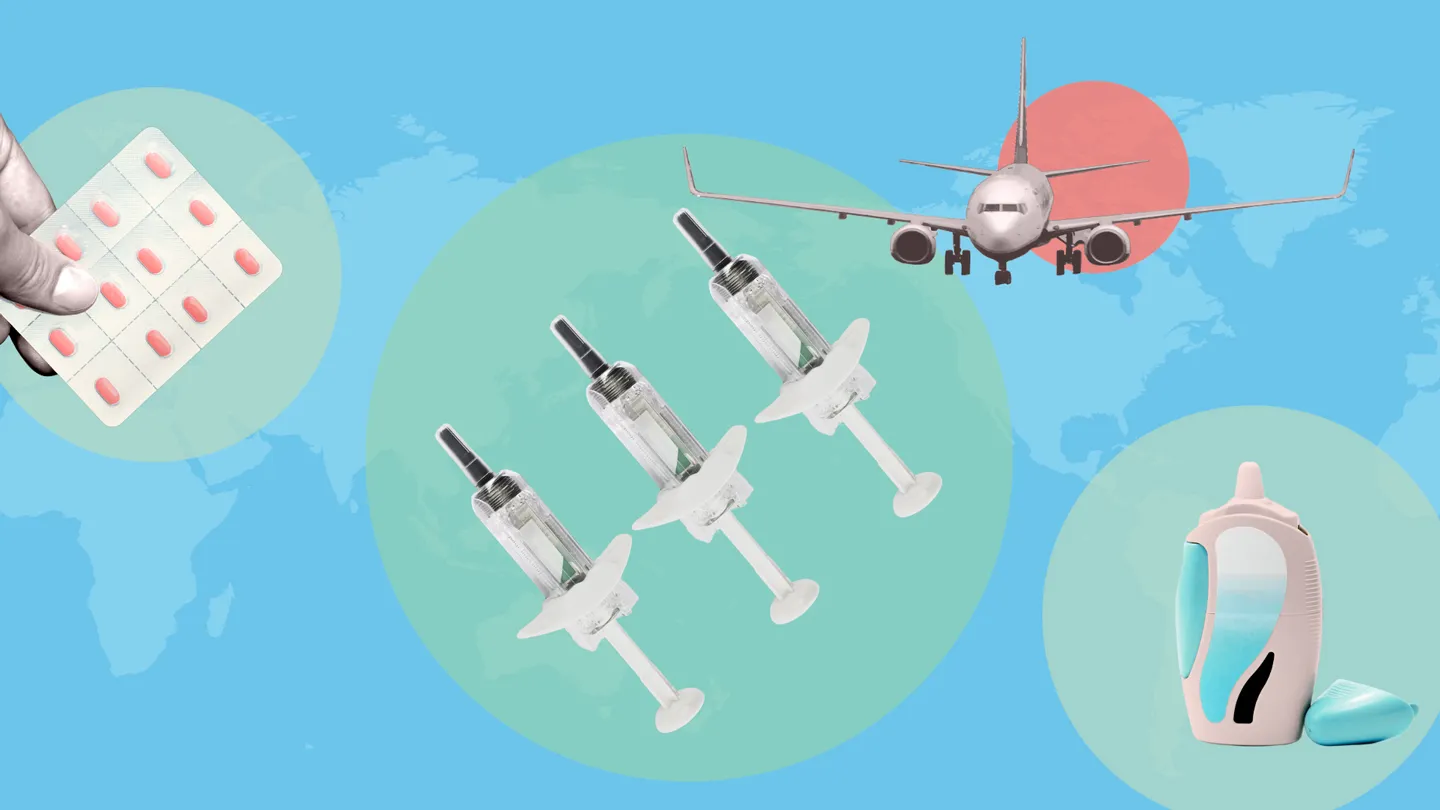When you’re getting ready for a trip, you have to plan for plenty of things. If you’re living with nasal polyps, it’s important to take certain factors into consideration, so you can prevent discomfort and reduce the risk of symptom flare-ups during your travels.
From difficulty breathing to nasal congestion and discomfort, here are possible travel challenges that may crop up — and hacks to help you sail through them.
1. Use a Steroid Nasal Spray When Flying
When flying on a plane, you’ll experience rapid changes in air pressure during takeoff and landing, which can affect sinuses, “depending on the extent of the nasal polyps and which sinuses may be blocked,” says James Lee, MD, an otolaryngologist at ENT & Allergy Specialists of Virginia in Ashburn. “There may be more pain and discomfort because of the sinuses being blocked.”
While short flights, which tend to cruise at lower altitudes, generally aren’t an issue, you’ll want to take some steps to reduce discomfort during longer journeys. “In long-distance, high-altitude flights, such as overseas or international, the barometric pressure changes are greater,” Dr. Lee notes.
Sometimes, a nasal steroid spray can help with congestion. “Using a 24-hour decongestant, such as oxymetazoline, the day of the flight can also help,” he adds. In more severe cases, a short course of steroids may help temporarily for travel.
Bonus tip: To be even more comfortable in flight, stay hydrated to counter dry airplane air, and chew gum or yawn to relieve ear pressure.
2. Take Allergy Medication to Combat Environmental Triggers
When you travel, new climates may expose you to allergens, pollen, or pollution that can aggravate polyps. “Seasonal outdoor allergens can lead to nasal congestion, [making the obstruction from nasal polyps worse],” says Lee. “People with nasal polyps should make sure they are using their prescribed allergy medications — such as antihistamine pills and nasal sprays — daily during allergy season and when exposure to allergens may be expected.”
In addition, high altitudes and low humidity can increase discomfort in new environments. Try a nasal steroid spray if you’re going into high altitudes, or bring a humidifier if you’ll be in dry climates.
3. Elevate Your Head When Sleeping
When you’re traveling, getting a good night’s sleep can already be challenging, as you’re sleeping in an unfamiliar bed and may be in a different time zone, which throws off your usual schedule. In addition, allergens in the room, dry hotel air, and poor air quality can further impact your sleep if you have nasal polyps.
“Since sleeping accommodations can be varied when traveling … try to elevate the head of the bed, either with pillows or a wedge underneath the mattress,” says Lee. “This allows gravity to have less contribution to nasal congestion, as compared to lying flat.”
You can also use a nasal saline rinse before going to sleep to clean out your nasal passages. Follow the rinse with a prescription nasal steroid spray, if needed.
And if dry air tends to aggravate symptoms, run your humidifier for a better night’s sleep.
4. Take Nasal Polyp Medications Regularly
Before you leave home, it’s important to have an ample supply of all of the nasal polyp medications you’re taking. “All allergy medications should be taken regularly, on a consistent schedule, when traveling,” says Lee.
Also remember that you’ll likely be off your usual schedule while traveling. “Time differences and changes in your sleep schedule should be taken into account,” Lee notes. “It is best to take [oral steroids, such as prednisone or methylprednisone], in the morning, as they may lead to insomnia if taken at night.”
If you plan to be on the road for an extended period of time, be sure to bring enough prescription doses. Packing a few extra may also be a good idea. And if you’re traveling internationally, check medication regulations for your destination country. Finally, keep medications with you, instead of checking them in a suitcase, in case your luggage gets lost or delayed.
5. Reduce Your Risk of Infection
Do your best to avoid getting sick while traveling, because that can lead to a sinus infection.
If you know someone is sick, avoid being around them. Also, consider wearing a face mask in crowded areas to avoid the risk of exposure to respiratory viruses. Before you travel, get up to date on recommended vaccines, too, including those for the flu and COVID.
The Takeaway
- When planning for your trip, keep possible nasal polyp triggers in mind, including changes in air pressure, exposure to allergens, and different climates or air quality.
- Pack plenty of nasal polyp medications, including allergy medications, nasal steroid sprays, and saline rinses. Consider bringing a wedge pillow and humidifier.
- Remember that you will be off your usual schedule when traveling, so plan accordingly to take medications at regular intervals.
Read the full article here




